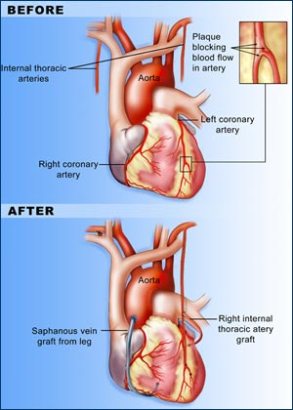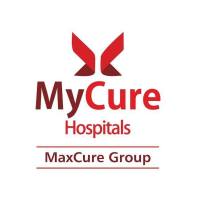 CABG is the surgical bypassing of blocked heart blood vessels. CABG improves blood flow to the heart and CABG Surgery is performed by a cardiothoracic surgeon. Surgeon is used to treat people who have severe coronary heart disease (CHD) or serious chest pain (angina) and CHD is a disease in which a waxy substance called plaque (plak) builds up inside the coronary arteries. These arteries supply oxygen-rich blood to your heart.
CABG is the surgical bypassing of blocked heart blood vessels. CABG improves blood flow to the heart and CABG Surgery is performed by a cardiothoracic surgeon. Surgeon is used to treat people who have severe coronary heart disease (CHD) or serious chest pain (angina) and CHD is a disease in which a waxy substance called plaque (plak) builds up inside the coronary arteries. These arteries supply oxygen-rich blood to your heart.Over time, plaque can harden or rupture (break open). Hardened plaque narrows the coronary arteries and reduces the flow of oxygen-rich blood to the heart. This can cause serious chest pain (angina).If the plaque ruptures, a blood clot can form on its surface. A large blood clot can mostly or completely block blood flow through a coronary artery. This is the most common cause of a heart attack.
During CABG, The surgeon attaches a healthy artery or vein from the body is connected (grafts) to the diseased heart artery, rerouting blood around the blockage in the same way a road detour re-routes traffic around road construction. This creates a new path for oxygen-rich blood to flow to the heart muscle.
Surgeons can bypass multiple blocked coronary arteries during one surgery.
![]() Single bypass – Single Coronary aretry
Single bypass – Single Coronary aretry
![]() Double bypass – Two coronary arteries are bypassed (E.g the left anterior descending (LAD) coronary artery and right coronary artery (RCA))
Double bypass – Two coronary arteries are bypassed (E.g the left anterior descending (LAD) coronary artery and right coronary artery (RCA))
![]() Triple bypass – three vessels are bypassed (E.g LAD, RCA, left Circumflex artery (LCX))…etc
Triple bypass – three vessels are bypassed (E.g LAD, RCA, left Circumflex artery (LCX))…etc
The surgery team includes:
![]() Cardiothoracic Surgeons
Cardiothoracic Surgeons
![]() Anesthesiologists
Anesthesiologists
![]() Perfusionists (the person operating the heart-lung machine, which gets oxygen to the blood during heart surgery)
Perfusionists (the person operating the heart-lung machine, which gets oxygen to the blood during heart surgery)
The surgery carries many benefits, including some particularly for patients who have serious cardiovascular disease.
![]() Coronary bypass surgery can give you your life back, if you are having a heart attack.
Coronary bypass surgery can give you your life back, if you are having a heart attack.
![]() If you have serious chest pain and shortness of breath from diseased heart arteries, elective coronary bypass surgery is highly effective at eliminating or reducing discomfort.
If you have serious chest pain and shortness of breath from diseased heart arteries, elective coronary bypass surgery is highly effective at eliminating or reducing discomfort.
![]() Because coronary bypass surgery is an open-heart procedure requiring general anesthesia and in many cases that the heart is stopped during the operation, bypass carries risks. The good news is that recent decades have seen a steep drop in serious complications. Today, more than 95 percent of people who undergo coronary bypass surgery do not experience serious complications, and the risk of death immediately after the procedure is only 1–2 percent.
Because coronary bypass surgery is an open-heart procedure requiring general anesthesia and in many cases that the heart is stopped during the operation, bypass carries risks. The good news is that recent decades have seen a steep drop in serious complications. Today, more than 95 percent of people who undergo coronary bypass surgery do not experience serious complications, and the risk of death immediately after the procedure is only 1–2 percent.
Click here to get 2nd opinion with our Chief Cardiovascular Thoracic Surgeon
